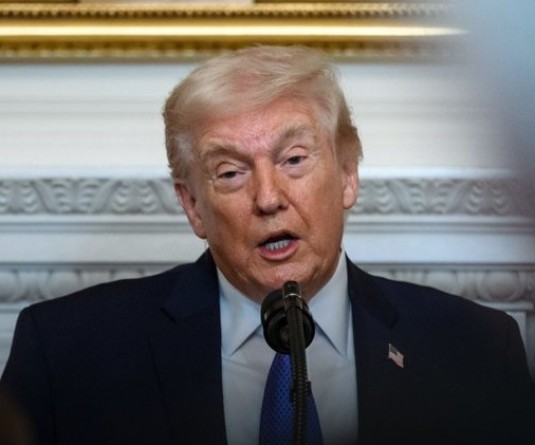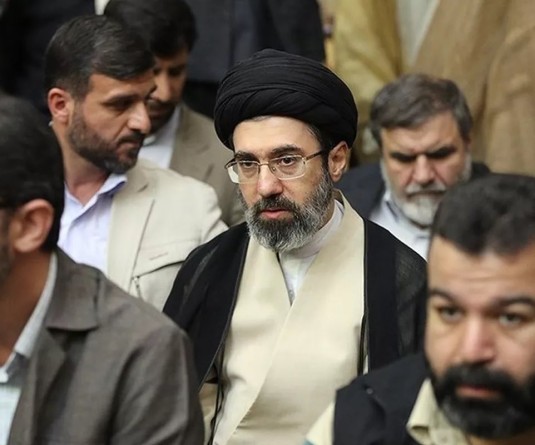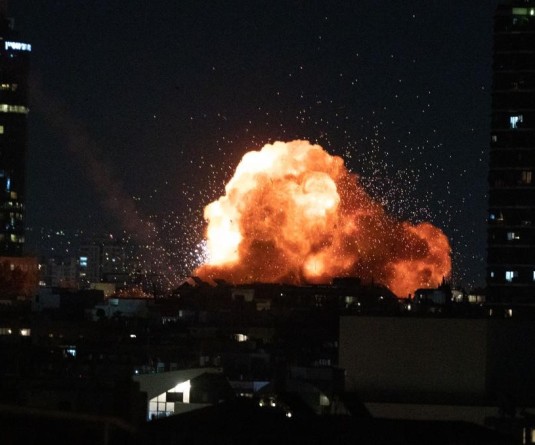
Egyptian anti-Mubarak protesters hang a horse’s saddle as a war trophy which was seized during violence earlier in the week when pro-Mubarak combatants, some on horses and camels, hurled concrete, metal bars and firebombs, and unleashed barrages of automatic gunfire, at Tahrir square in Cairo, Egypt on Sunday, February 6. The words in Arabic reads: “ the trophy of foal battle”. (AP Photo)
CAIRO, February 6 (Reuters): Egypt tried to get the nation back to work on Sunday with banks reopening, and the vice president held unprecedented talks with a banned Islamist group and other opponents about their demand that President Hosni Mubarak quit. A steady stream of employees flowed into Cairo's financial district and customers queued to access their accounts, the first day for banks to open after a week-long closure.
Armoured personnel carriers stood guard at intersections where soldiers had erected sandbag barriers, as buses dropped employees off at large state banks. Demonstrators in Cairo's Tahrir Square, marking a "Day of Martyrs" for those killed in protests, said they would intensify their 12-day battle to oust the president who has vowed to stay on until September elections.
With some Egyptians keen for a return to normal after unrest that the United Nations says may have killed 300 people, the government has warned of the damage to political stability and the economy of prolonging protests that shook the Middle East. The commander of the army, which many say holds the key to Egypt's future, was touring Tahrir (Liberation) Square to try to persuade the protesters, complaining about poverty, repression and corruption, to leave the usually busy intersection. "We want people to go back to work and to get paid, and life to get back to normal," army commander Hassan al-Roweny said.
The United States, Egypt's ally which provides the army with $1.3 billion annually, has underlined the need for gradual change and political talks between the government and opposition groups in order to achieve an orderly handover of power.
With signs of economic life resuming and concessions from the government to the reform movement, the cabinet wants the uprising to settle down to political talks to put an end to clashes between demonstrators and Mubarak supporters. There have also been signs of compromise in the opposition movement, with leaders backing off their refusal to talk to the government until Mubarak, 82, and the old guard leave.
But many reformists who used the Internet to mobilize mass support for change are determined to immediately force out Mubarak, a former air force commander who took over when Anwar Sadat was assassinated, fearing a loss of momentum. Mohamed ElBaradei, who has emerged as a spokesman for the opposition, said there was a "hard core" who would never give up their protest in Tahrir Square and other cities around Egypt until Mubarak steps down. He was anxious about more violence.
"It might not be every day but what I hear is that they might stage demonstrations every other day," said the Nobel peace laureate. "The difference is that it would become more angry and more vicious. And I do not want to see it turning from a beautiful, peaceful revolution into a bloody revolution." The United States has backed the talks between Vice President Omar Suleiman, a long-time intelligence chief, and opposition groups, and made clear dialogue must be given time.
Suleiman met the groups on Sunday in talks joined for the first time by the Muslim Brotherhood, Egypt's most organized opposition group, which had previously refused to talk to the government until Mubarak left. "We have decided to engage in a round of dialogue to ascertain the seriousness of officials toward the demands of the people and their willingness to respond to them," a spokesman for the banned Brotherhood told Reuters on Saturday.
It is testimony to the ground protesters have gained that the government is willing to talk to the group which would have been unthinkable before the protests started on January 25. Before that date members were being regularly rounded up and jailed. The Brotherhood, which took a backseat in the early days of the protest and then raised its profile, has downplayed Israel's fears of an Iranian-style theocracy emerging in Egypt.
Symbolically, the leadership of Egypt's ruling National Democratic Party resigned on Saturday, including the president's son Gamal, in a move the Brotherhood said was a ruse aimed to "choke the revolution." In the early days of the uprising its offices on the banks of the Nile were burned down.
Opposition activists reject any compromise which would see Mubarak hand over power to Suleiman but also serve out his term -- essentially relying on the old authoritarian system to pave the way to full civilian democracy and saving his face.
Armoured personnel carriers stood guard at intersections where soldiers had erected sandbag barriers, as buses dropped employees off at large state banks. Demonstrators in Cairo's Tahrir Square, marking a "Day of Martyrs" for those killed in protests, said they would intensify their 12-day battle to oust the president who has vowed to stay on until September elections.
With some Egyptians keen for a return to normal after unrest that the United Nations says may have killed 300 people, the government has warned of the damage to political stability and the economy of prolonging protests that shook the Middle East. The commander of the army, which many say holds the key to Egypt's future, was touring Tahrir (Liberation) Square to try to persuade the protesters, complaining about poverty, repression and corruption, to leave the usually busy intersection. "We want people to go back to work and to get paid, and life to get back to normal," army commander Hassan al-Roweny said.
The United States, Egypt's ally which provides the army with $1.3 billion annually, has underlined the need for gradual change and political talks between the government and opposition groups in order to achieve an orderly handover of power.
With signs of economic life resuming and concessions from the government to the reform movement, the cabinet wants the uprising to settle down to political talks to put an end to clashes between demonstrators and Mubarak supporters. There have also been signs of compromise in the opposition movement, with leaders backing off their refusal to talk to the government until Mubarak, 82, and the old guard leave.
But many reformists who used the Internet to mobilize mass support for change are determined to immediately force out Mubarak, a former air force commander who took over when Anwar Sadat was assassinated, fearing a loss of momentum. Mohamed ElBaradei, who has emerged as a spokesman for the opposition, said there was a "hard core" who would never give up their protest in Tahrir Square and other cities around Egypt until Mubarak steps down. He was anxious about more violence.
"It might not be every day but what I hear is that they might stage demonstrations every other day," said the Nobel peace laureate. "The difference is that it would become more angry and more vicious. And I do not want to see it turning from a beautiful, peaceful revolution into a bloody revolution." The United States has backed the talks between Vice President Omar Suleiman, a long-time intelligence chief, and opposition groups, and made clear dialogue must be given time.
Suleiman met the groups on Sunday in talks joined for the first time by the Muslim Brotherhood, Egypt's most organized opposition group, which had previously refused to talk to the government until Mubarak left. "We have decided to engage in a round of dialogue to ascertain the seriousness of officials toward the demands of the people and their willingness to respond to them," a spokesman for the banned Brotherhood told Reuters on Saturday.
It is testimony to the ground protesters have gained that the government is willing to talk to the group which would have been unthinkable before the protests started on January 25. Before that date members were being regularly rounded up and jailed. The Brotherhood, which took a backseat in the early days of the protest and then raised its profile, has downplayed Israel's fears of an Iranian-style theocracy emerging in Egypt.
Symbolically, the leadership of Egypt's ruling National Democratic Party resigned on Saturday, including the president's son Gamal, in a move the Brotherhood said was a ruse aimed to "choke the revolution." In the early days of the uprising its offices on the banks of the Nile were burned down.
Opposition activists reject any compromise which would see Mubarak hand over power to Suleiman but also serve out his term -- essentially relying on the old authoritarian system to pave the way to full civilian democracy and saving his face.






